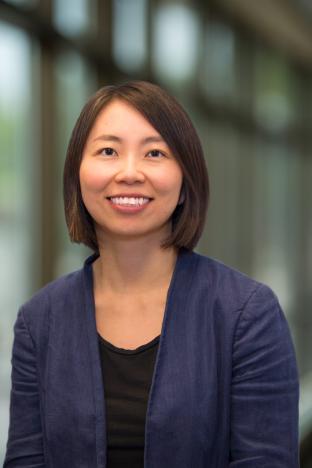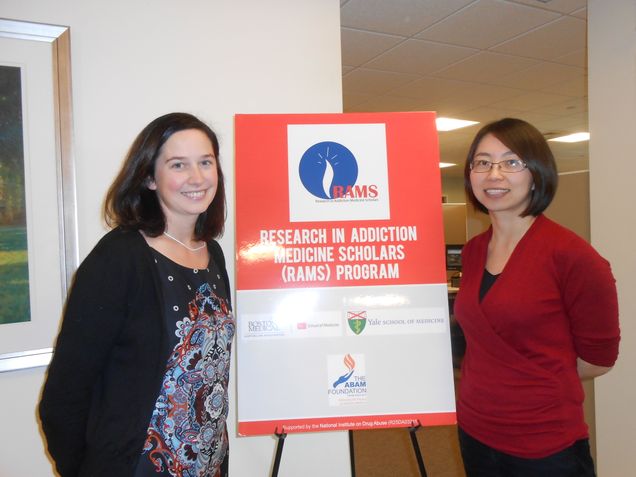RAMS Alumni Spotlight: Dr. Lewei (Allison) Lin
 For our February 2025 RAMS Alumni Spotlight, we interviewed Dr. Lewei (Allison) Lin, MD, MS, from the 4th RAMS Cohort (2015-2017) about her background and work since completing the RAMS Program.
For our February 2025 RAMS Alumni Spotlight, we interviewed Dr. Lewei (Allison) Lin, MD, MS, from the 4th RAMS Cohort (2015-2017) about her background and work since completing the RAMS Program.
Allison is an Addiction Psychiatrist and Associate Professor in the Department of Psychiatry at the University of Michigan Medical School as well as Research Scientist at the VA Ann Arbor Healthcare System. Her research focuses on identifying actionable contributors, gaps and disparities in access and quality of addiction care using large healthcare datasets and developing new interventions and models of care, including through use of telehealth, to improve reach and delivery of evidence-based care to patients
Read on to learn more about Allison!
Tell us about your clinical and research background. What led you to study substance use?
I loved my psychiatry clinical training but was always drawn to questions about not just the patients in front of me, but what were the system-related factors that contributed to their presentation. For example, I would be drawn to not only best approaches to caring for a patient presenting to the psychiatry ED for suicidal ideation, but trying to understand the systemic factors that had contributed to her untreated trauma, alcohol use disorder and difficulties managing chronic pain. During my training, I wanted to learn not only to make clinical decisions and how to help the patient in front of me, but also understand and intervene more broadly on the factors that contributed to the presentation of many patients.
I was curious about lots of clinical questions in psychiatry, but many different things shaped my interest in addiction. The first real factor was my experience working with Antoine Douaihy, an addiction psychiatrist I met in my intern year. He is a leading expert in motivational interviewing (MI) and an incredible teacher. As a trainee, we would conduct brief MI sessions during morning rounds with our patients while the entire team observed and gave detailed feedback. For example, someone might ask, “Did you notice how that patient reacted when you worded your question that way?” Sometimes this training approach could feel intimidating, but I learned that what and how I said things mattered and that my job was not to change someone else, but that treatment instead could mean sitting with someone, truly listening and demonstrating you care, and helping them articulate the changes important to them.
In what ways did your involvement with the RAMS Program assist you with your research career?
RAMS was a great opportunity for me! I had some addiction research exposure at that time, but RAMS really introduced me to the wonderful community of addiction clinician scientists who are passionate about research that can translate into improved care for our patients. There were also some important fundamental things. I had heard terms like “K award” before, but a lot of things in the research career path always felt like an intimidating black box. RAMS really helped start to unpackage that for me, and I think many others, and made me feel like this career might be possible. As clinicians, rightfully, we spend so many years in clinical training. I had felt out of place at the few addiction conferences I attended before. And research felt daunting, and I didn’t have a lot of models of addiction clinicians, but RAMs helped introduce me to the many successful clinician researchers who lead research that can improve clinical care.
RAMS also continues to be an important thread for me. For example, I met Marc Larochelle, who had presented at some of the workshops during my RAMS fellowship, and I had the opportunity to continue to collaborate occasionally. Then a few years ago, I reached out about a grant idea. We ended up starting to work on it during a CPDD conference and now we MPI a mixed-methods R01 focused on informing real-world clinical decision-making around telehealth for buprenorphine treatment. In addition, I’ve also reached out to RAMS alum with questions throughout the years. It’s a great group!

What is one area of your research that you find exciting or surprising so far?
With my close collaborator, Erin Bonar, we’ve been recently testing new models of care focused on helping to reach and deliver care to the vast majority of people with substance use disorders who are not seeking treatment. Historically, much of addiction research, by way of populations we recruit from, has focused on people who are presenting for addiction treatment. We’re finding that how we think about treatment has to be different to engage patients who are not seeking care. We are conducting several studies to evaluate some newer models of care and find that engagement itself has to be a key goal of care delivery when working with people who often don’t identify themselves as having a SUD.
Tell us about some directions you see your research going in.
Although this continues to feel intimidating, I hope to conduct research that is even more pragmatic. As clinician scientists, I think it’s important that we bring our experiences of real-world clinical care and challenges to identify what are the key research questions of our time. For me, to do a better job at that, it means trying to do more pragmatic research in clinical settings. I have a new project that will evaluate a hub and spoke model to help mental health and primary care clinics in rural communities try to implement a range of harm reduction services. Similarly, in our health services research, I hope to continue to prioritize research that can inform clinical addiction care – the goal would be to do research that can be relevant and helpful for clinicians and patients.
Tell us one thing about yourself that readers might find interesting.
Last year, I started really wanting to learn home improvement skills. I started by renovating a room in our basement. Being able to knock a hole in drywall and then feeling confident about being able to make it like new again is so gratifying! I’m hoping to work up to larger projects. There are always so many little questions to figure out and it can seem daunting, but so gratifying at the end and actually a nice counter-balance to research, which often takes a long time to see concrete results.